5 Situations When You Need to Use Preterite in Spanish Tell Me In Spanish
The pretérito ( preterite) tense is one of the tenses used in Spanish to talk about the past. We use the preterite to talk about actions that were completed in the past. The other Spanish tense that we use to describe the past is the imperfect. Learn about the imperfect tense with this article. Conjugating verbs in the preterite tense is simple!

Spanish Preterite Verbs List of Regular Preterite Verbs Spanish with
Preterite conjugation chart This poster and PDF will give you the 99 most often used Spanish verbs in the Preterite tense. It is a guide on how to fluently use the Simple Past in any day conversation and writing. Order it here, print it out and keep it at hand to utilize when you need it!

Spanish lesson 80 Irregulars verbs (2) Preterite Conjugation
ser preterite tense. spanish past tense ser. Preterite (Past Tense) Conjugation of ser - Pretérito (pretérito perfecto simple) de ser. Spanish Verb Conjugation: yo fui, tú fuiste, él / Ud.….
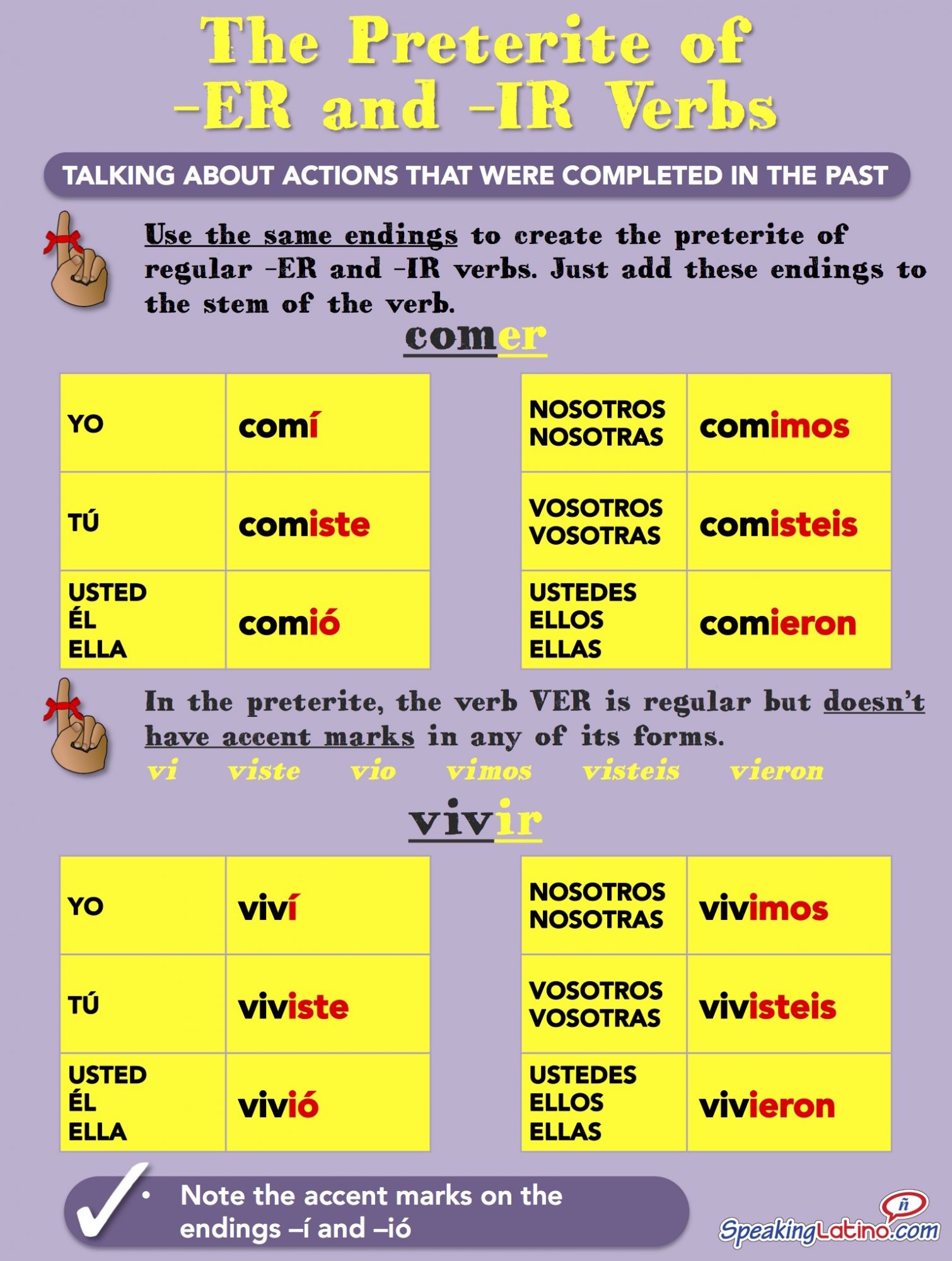
Preterite Regular Er And Ir Verbs Irregular Verbs Verb Preterite My
To conjugate a regular verb in the preterite tense, remove the infinitive ending and add the appropriate endings. For an - ar verb that is regular in the preterite, use the endings from Table 1. (Not all verbs that were regular in the present tense are regular in the preterite.)

Clipart Nutzen Conjugation
The preterite is used to describe actions which have been completed. Spanish verbs come in three categories ( -ar, -ir, and -er) and change ("conjugate") according to who performed it and when the action occurred. To form the preterite in Spanish with regular verbs, remove the -ar, -ir, or -er and add the appropriate ending from the chart below.
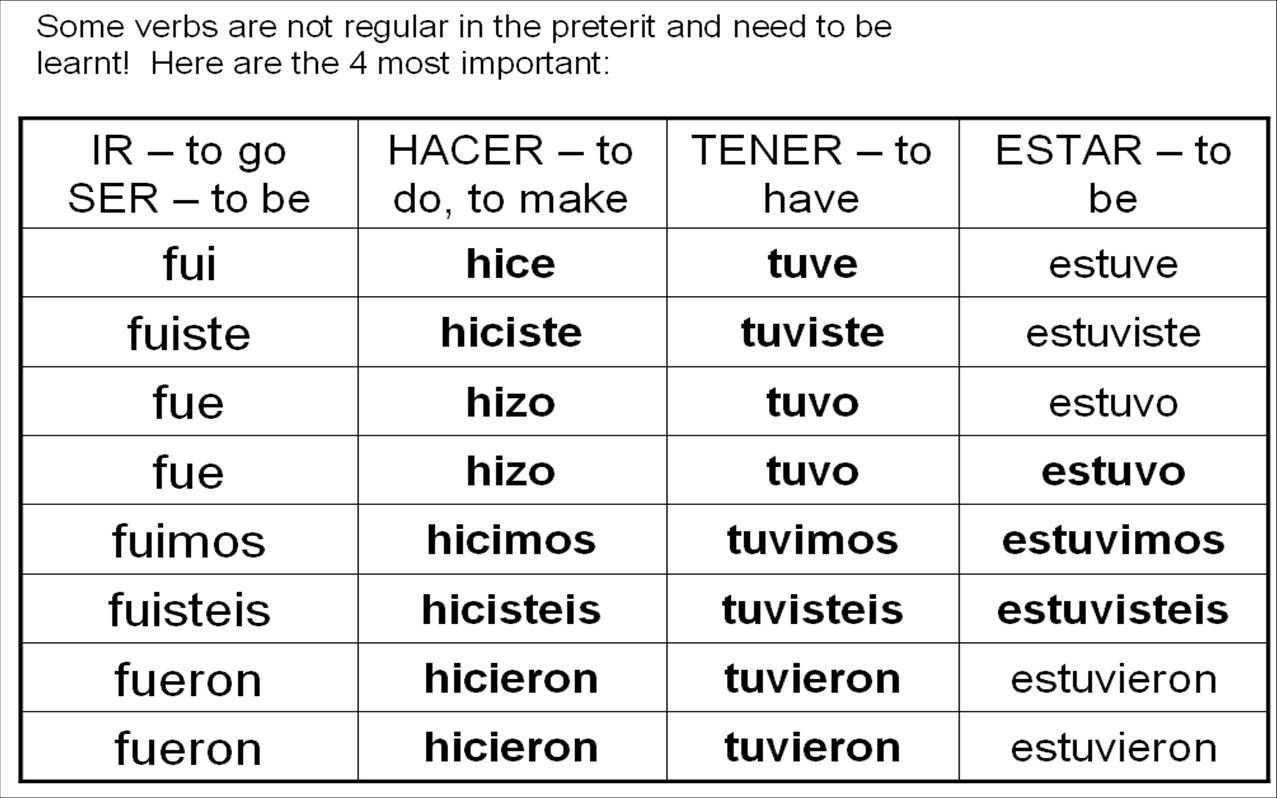
Ir Preterite Tense Conjugation Chart
Conjugation Drills. Master any verb in any tense with personalized, interactive drills. Practice Now. Conjugate Spanish verbs with our conjugator. Verb conjugations include preterite, imperfect, future, conditional, subjunctive, and more tenses.
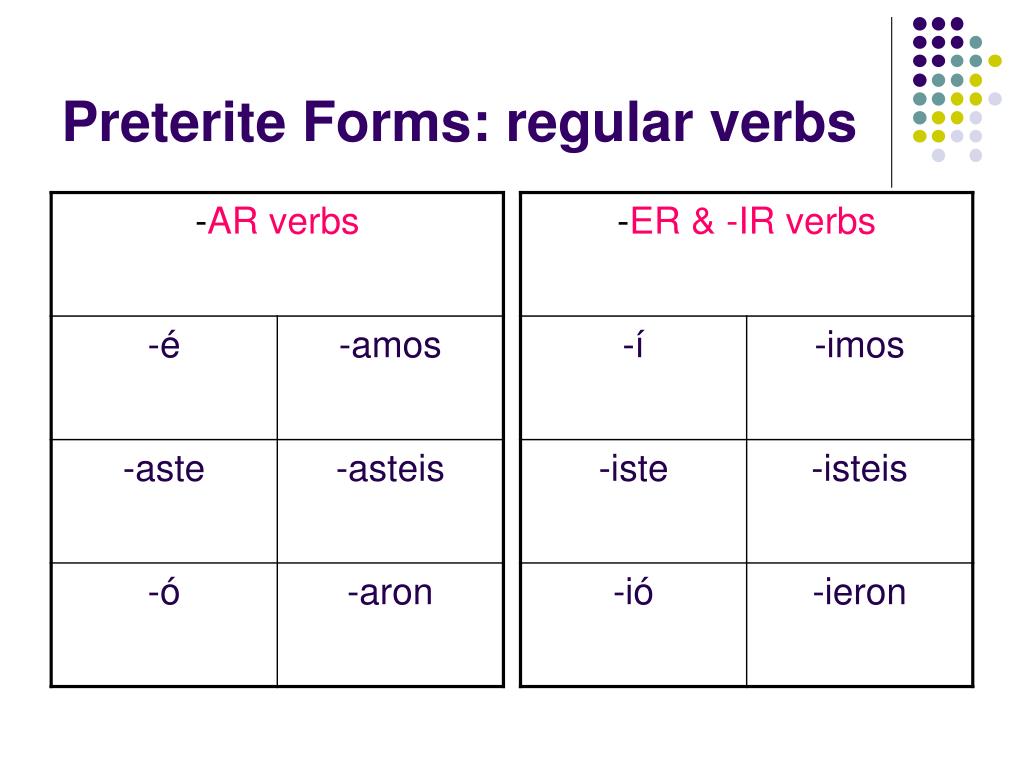
Preterite Tense Chart
Essentially, the preterite tense is used to express actions which were completed at some point in the past, had beginnings and ends, took place at or during specified time periods (days, months, etc.) or occurred in a sequence. This post explains the preterite conjugations for regular and irregular verbs as well as various uses in detail.
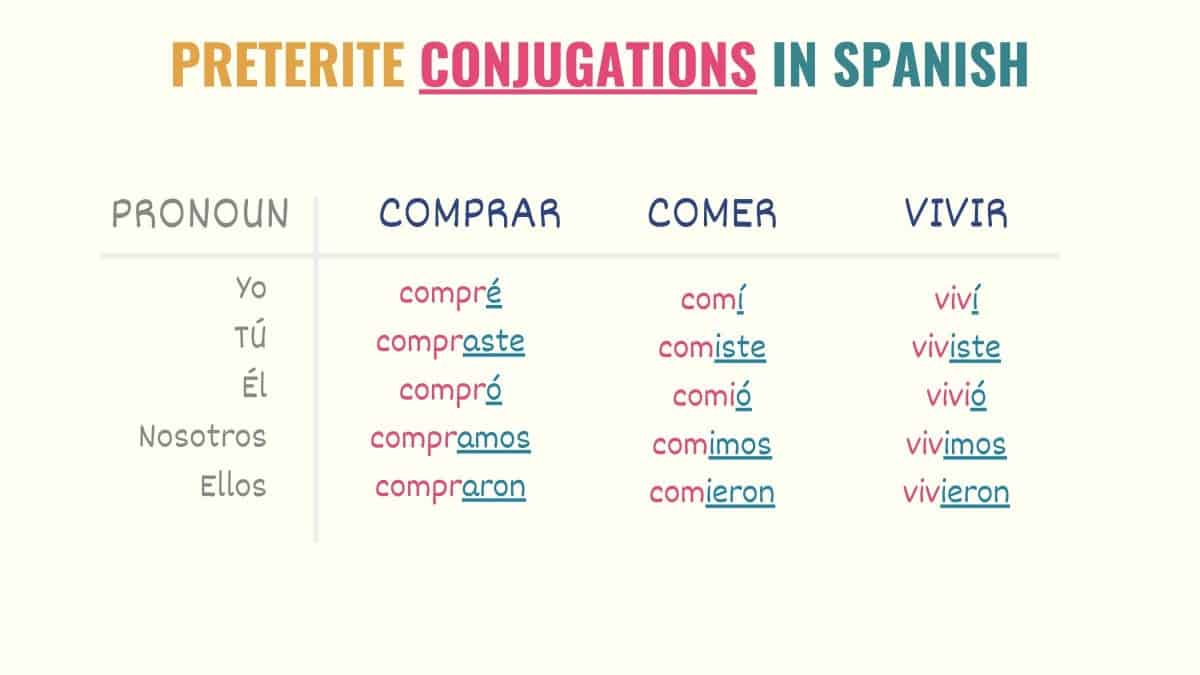
Spanish Preterite Tense 101 Uses, Rules & Conjugations Tell Me In
Pretérito (pretérito perfecto simple) Uses of the Preterite Tense in Spanish Used to express an action that was completed in the past. Example: He arrived yesterday. Preterite (Past Tense) -AR Verbs nosotros [STEM] + amos vosotros [STEM] + asteis ellos / Uds. [STEM] + aron Preterite (Past Tense) -ER & -IR Verbs ellos / Uds. [STEM] + ieron

Pedir Preterite Verb Chart bmpcity
Check answer Practice your verb conjugations with helpful drills and quizzes.
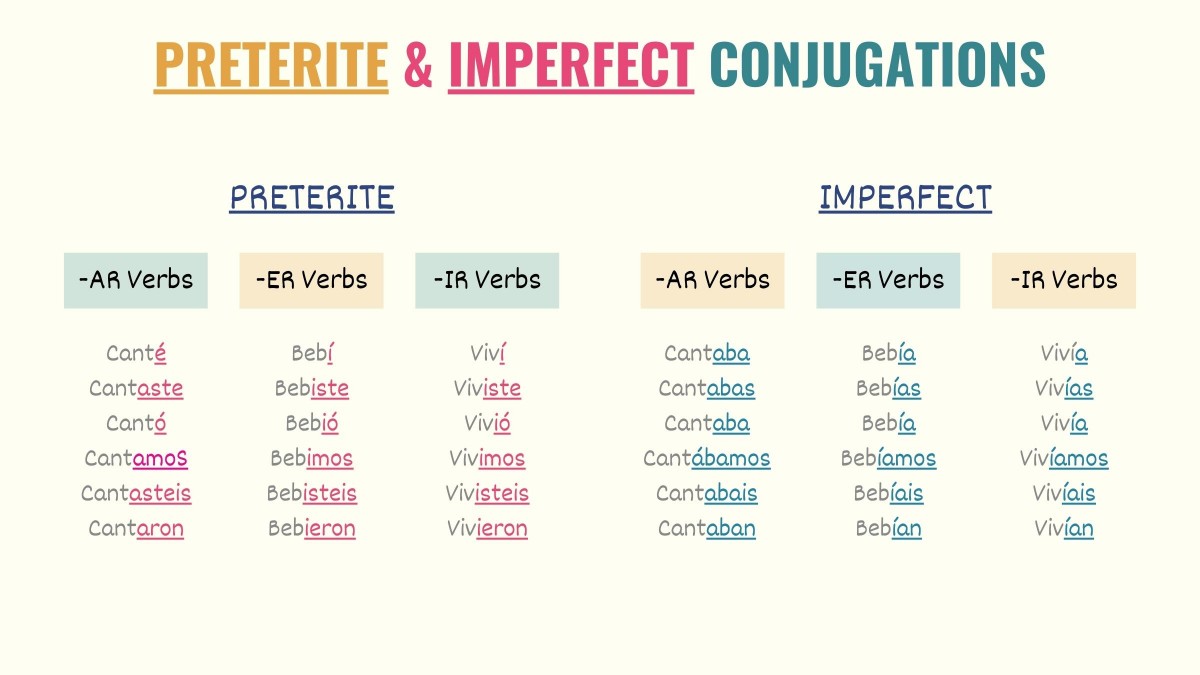
Spanish Past Tenses 101 Preterite vs Imperfect Tell Me In Spanish
Conjugation Drill Explanation Many students have trouble knowing when to use the preterite tense or the imperfect tense, as they both refer to actions in the past.

Preterite Tense Chart
It's used to describe events that happened and ended in the past, such as events that have a clear beginning and end. The preterite is often referred to as simple past Spanish, or even just the Spanish past tense. When do we use preterite tense Spanish? To talk about something that happened at a specific point in the past
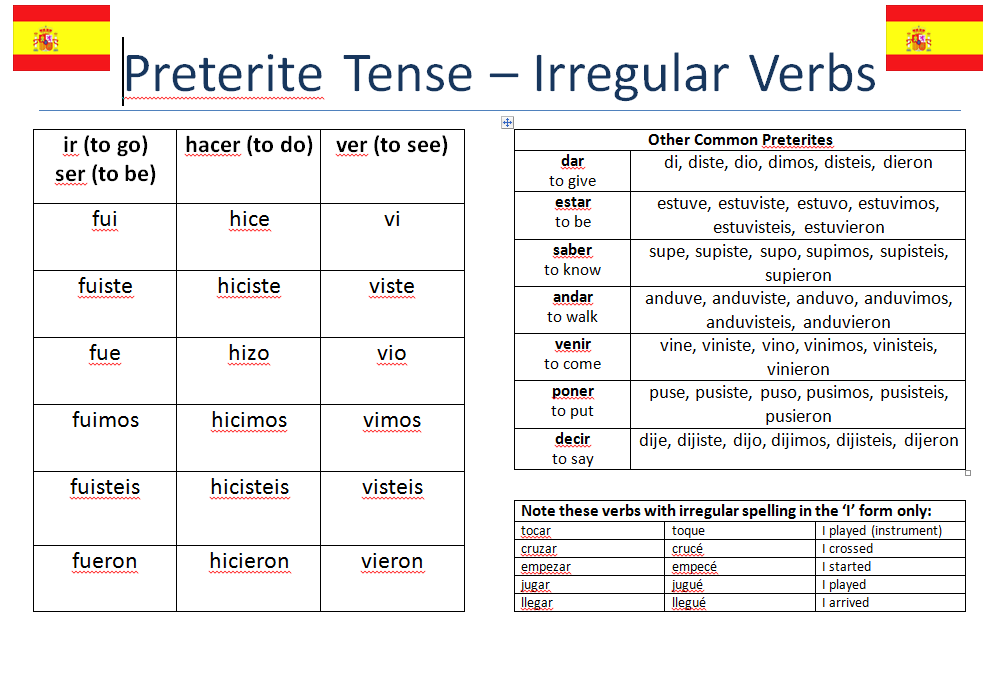
The Language Zone Preterite Tense
What is meant by preterite conjugation? The preterite tense is a Spanish tense used to discuss events that happened in the past. It is used when discussing past events which occurred during a.

Preterite verbs
Regular Spanish Preterite Forms. There are only two sets of endings for regular preterite verbs, one for -ar verbs and one for both -er and -ir verbs. To conjugate a regular verb in the preterite tense, simply remove the infinitive ending (-ar, -er, or -ir) and add the preterite ending that matches the subject. Check out the table of regular.
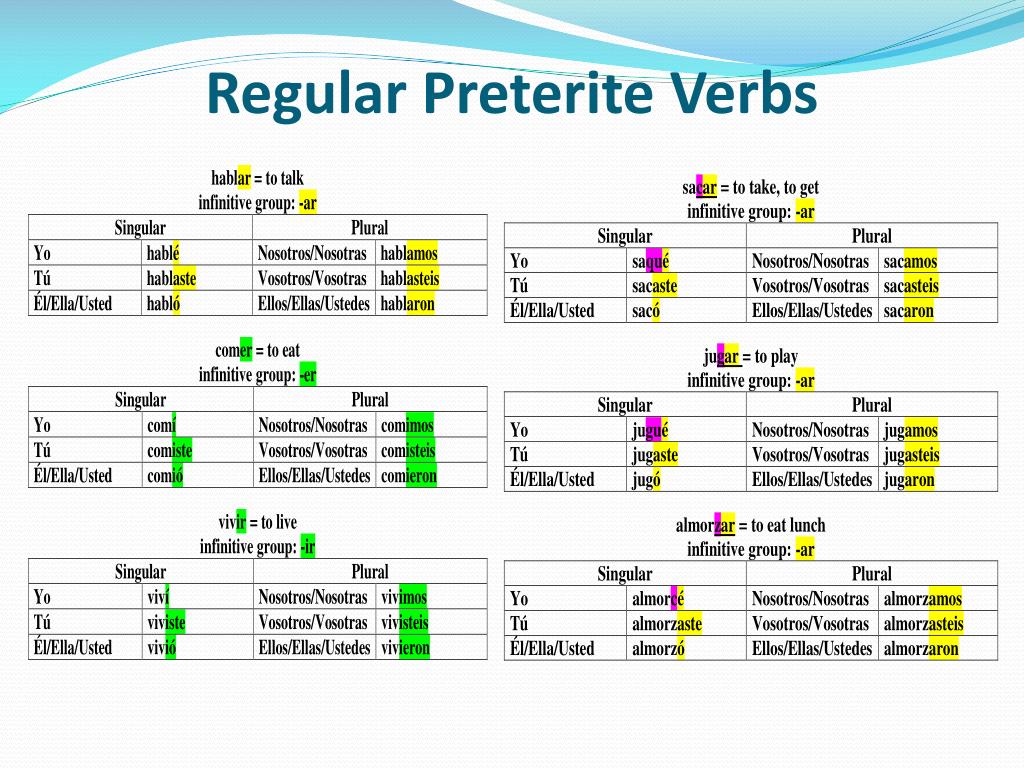
Preterite Tense Chart
Here are common regular preterite verbs in Spanish along with their conjugation. You will notice six verb forms, belonging respectively to the following persons: (1) yo; (2) tu and vos; (3) él, ella, usted; (4) nosotros, nosotras; (5) vosotros, vosotras; (6) ellos, ellas and ustedes. For a full list of irregular preterite verbs, visit the post.

Spanish lesson 91 Irregulars verbs (4) Preterite Conjugation
Conjugation Charts Simple Tenses Present Tense / Presente (de indicativo) Imperfect Tense / Imperfecto (de indicativo) Preterite (Past Tense) / Pretérito (pretérito perfecto simple) Future Tense / Futuro Conditional Tense / Condicional (potencial simple) Subjunctive (Present Subjunctive) / Presente de subjuntivo

Preterite conjugation chart PDF Spanish conjugation chart & guide
The irregular stem that is listed next to the verbs in the following chart is used for every form of the preterite conjugation. All of the following verbs take the endings from Table 1 to form their preterite conjugation chart. The verb tener (to have) is extremely common, so memorize the forms of tener in the preterite shown in Table 2.